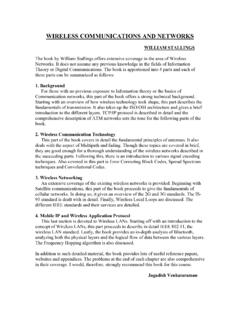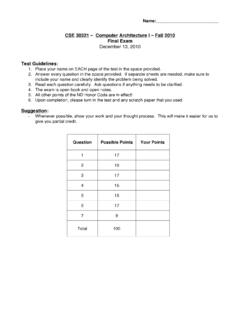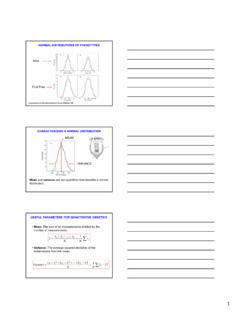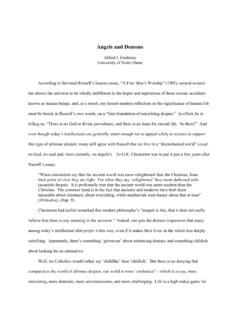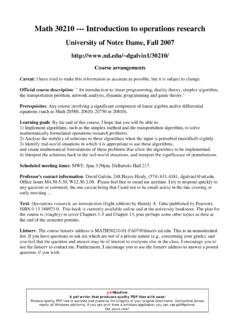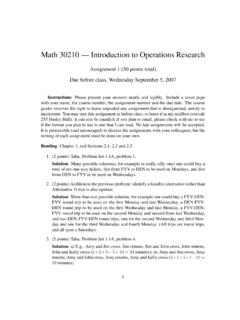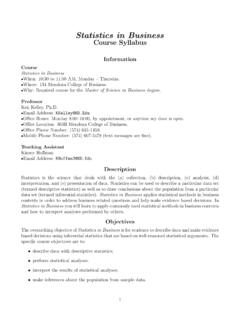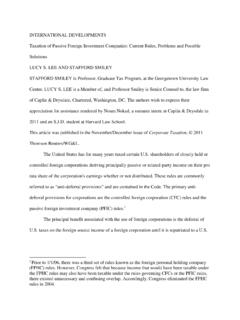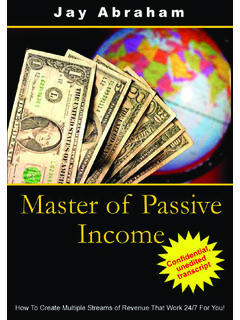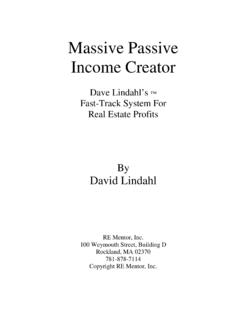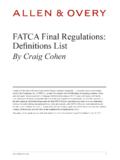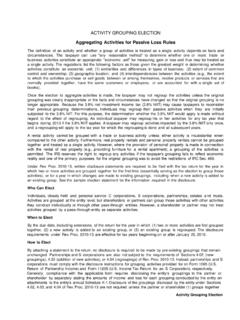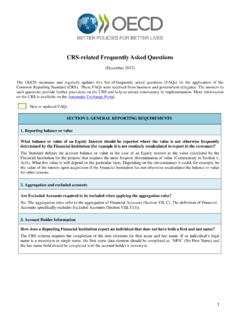Transcription of The Taxation of Passive Foreign Investment: Lessons from ...
1 1 Preliminary version. Do not post on the web! The Taxation of Passive Foreign investment : Lessons from German Experience by Martin Ruf (Mannheim University) and Alfons J. Weichenrieder# (Goethe-University Frankfurt, Oxford University Centre for Business Taxation & CESifo) This version: 22 May 2008 Abstract The paper evaluates the working of German CFC rules that restrict the use of Foreign subsidiaries located in low-tax countries to shelter the income from Passive investment from home Taxation . While Passive investments make up a large fraction of German outbound FDI, we find that German CFC rules are quite effective in restricting investments in low-tax jurisdictions. At the same time, we find evidence that the German 2001 tax reform, which unilaterally introduced exemption of Passive income in medium and high-tax countries, has led to some shifting in Passive assets of German multinationals.
2 Keywords: Foreign direct investment , CFC regulation, Passive investment JEL classification: H25, H73 Addresses of authors Martin Ruf Alfons J. Weichenrieder University of Mannheim Goethe University, Frankfurt Faculty of Business Administration Faculty of Economics and Business Administration 68131 Mannheim 60054 Frankfurt (Main) # The hospitality and support by the Deutsche Bundesbank Research Center is gratefully acknowledged. The second author gratefully acknowledges financial support from the Deutsche Forschungsgemeinschaft (DFG). 2 I. INTRODUCTION The treatment of Foreign source income of domestic corporations is one of the main issues in shaping a country's international tax rules. The treatment of dividends received from a Foreign subsidiary usually follows one of two approaches. Exemption countries, such as the Netherlands, France, and Belgium abstain from Taxation of those dividends.
3 This reflects a territorial approach to international Taxation . Countries like the , the UK or Japan adhere to the residence approach that subjects worldwide repatriated income to domestic Taxation . At the same time, these countries provide a credit for Foreign dividends. In such a credit system, the Foreign dividend is subject to corporate tax when received by the parent, but a tax credit that takes into account taxes paid by the Foreign subsidiary on profits that underlie the distributed dividend may be credited. This is also called an indirect tax credit, while a tax credit that is granted for Foreign withholding taxes on the dividend is called a direct tax credit. Usually, capital exporting countries, which use a credit system, provide for both the indirect and the direct credit in cases of a qualifying participation. One of the problems that may haunt both exemption and credit countries is that domestic firms use low tax jurisdictions to shelter their income from possibly higher home country Taxation .
4 In the case where the home country runs an exemption system this is self-evident: Foreign income earned by a Foreign subsidiary and subject to low Taxation abroad is exempt from high domestic taxes. In the case of credit countries, there still may be an advantage of low Foreign tax rates as the home tax may be deferred until repatriation of the Foreign profit. These tax shelters are generally accepted by home countries of parent corporations in the case of active Foreign profits that derive from production, trade and services. Here a possible argument for doing so is capital import neutrality: Foreign subsidiaries of high tax parents should be given the possibility to compete with native low-tax 3firms on an equal basis (Musgrave 1969). Subjecting profits of Foreign subsidiaries to immediate home country Taxation may put them at a disadvantage.
5 While acceptable in the case of active business income abroad, the tax shelter implied by exemption or, to a lesser extent, deferral of home country taxes is much less palatable for capital exporting countries if the Foreign subsidiary is not competing abroad, but merely acts as an instrument to manage the company group's liquid assets. Most industrialized countries have therefore legislated measures that limit the tax privilege of exemption or deferral in the case of Passive investments. The standard approach used in the legislation on controlled Foreign companies (CFC rules) by countries such as the , Germany, France, the UK, Italy, the Netherlands, Switzerland, Luxembourg, or Austria is to tax Passive investment income of Foreign subsidiaries on an accrual basis if some conditions are met and the privilege of exemption or deferral is not extended to these incomes. While CFC rules are of considerable importance in the legal and theoretical discussions of international corporate tax systems (see Weichenrieder 1996 for a theoretical study and Lang et al.)
6 2004 for a legal comparison of international CFC rules), we are not aware of studies that empirically discuss the effectiveness of CFC One of the main purposes of this paper is to fill this gap by looking at the German experience. A first empirical question that arises is about the magnitude and country distribution of Passive assets held by German-owned Foreign subsidiaries. To what extent do we see a concentration of Passive assets in jurisdictions with low corporate taxes? As the German CFC rules provide for a safe haven if the Foreign tax rate reaches a minimum level, is there evidence for a discontinuity in the sense that Passive investment is concentrated in countries for which the safe haven is just applying? There are several approaches that we are using in this paper to shed light on the effectiveness of CFC rules. One approach is to consider whether changes in tax rates affect 1 A notable exception applies in the case of the analysis of hybrid structures and the "check the box" rules.
7 See Mutti and Grubert (2006) for details. 4passive investment depending on whether CFC legislation is applicable or not. Our estimates suggest that there indeed is a significant difference. The applicability of the German CFC rules seems to reduce the attractiveness of low local tax rates for Passive investment . Over the last decades there were also several changes in the German CFC legislation. One of the changes that we exploit for our purposes is the 2003 reform that ended a tax preference that the CFC rules had given to intra-company lending as compared to arms'-length investment . We find that the reform had some impact on intra-company loans provided by low-tax subsidiaries, which is in line with expectations. We also make use of the German 2001 reform that extended the exemption method to a wider set of countries. Overall, the evidence provided in this paper is that German CFC rules have a significant and predictable impact on multinational financing and seem to be a powerful measure to curb tax avoidance.
8 We hope that our empirical results have some value for evaluating tax policy options. If CFC rules were rather ineffective, then deferral countries may have a comparative advantage over exemption countries in curbing Passive investment abroad. In the case of ineffective CFC rules, an exemption country foregoes Taxation of Passive income altogether, while in the case of a deferral system home country taxes are only postponed. Conversely, in the case of effective CFC rules, moving from a deferral system to an exemption of Foreign dividend as currently discussed in the and the UK may come at a relatively small cost in terms of additional Passive investment abroad. II. German CFC Rules While resident individuals are taxed on their worldwide income irrespective of whether a dividend has been paid by a German or Foreign corporation, Foreign dividends that are received by a German corporation are exempt.
9 In addition, the German corporation is not 5taxable on retained earnings Since 1972, however, limits apply due to 7 14 of the German Au ensteuergesetz (German Foreign Tax Act).3 These CFC rules closely follow the subpart F legislation, introduced in 1964, and address resident shareholders of controlled Foreign corporations investing in low-taxed Passive business operations. Under certain conditions, the German rules provide that the pro rata share of low-taxed Passive income of a controlled Foreign corporation (CFC) abroad is included in the shareholder s income on a current basis, implying that deferral and exemption are denied. German CFC rules are applicable if three requirements are met. Ownership requirement. In general, the ownership requirement is met if more than 50 percent of ordinary shares or voting rights in the Foreign corporation are held directly or indirectly by German resident individuals or Passive income .
10 Shareholders of a CFC may be subject to tax on the Passive income of the CFC, where the term Passive income is defined negatively. Passive income is any income that does not qualify as active under 8 (1) Au ensteuergesetz. Active income is income from agriculture, production, banking and insurance, trade, dividends and the disposal of shares. Under some additional requirements also income from services and renting and leasing is deemed to be active. income from borrowing and lending of capital is active if the German resident shareholder proves that all of the capital is raised in Foreign capital markets from unrelated persons and the same capital is lent to an active Foreign business or permanent establishment or to a German business or permanent establishment. As a consequence, interest 2 Until 2000, the exemption of Foreign dividends was restricted to dividends paid from treaty countries.
